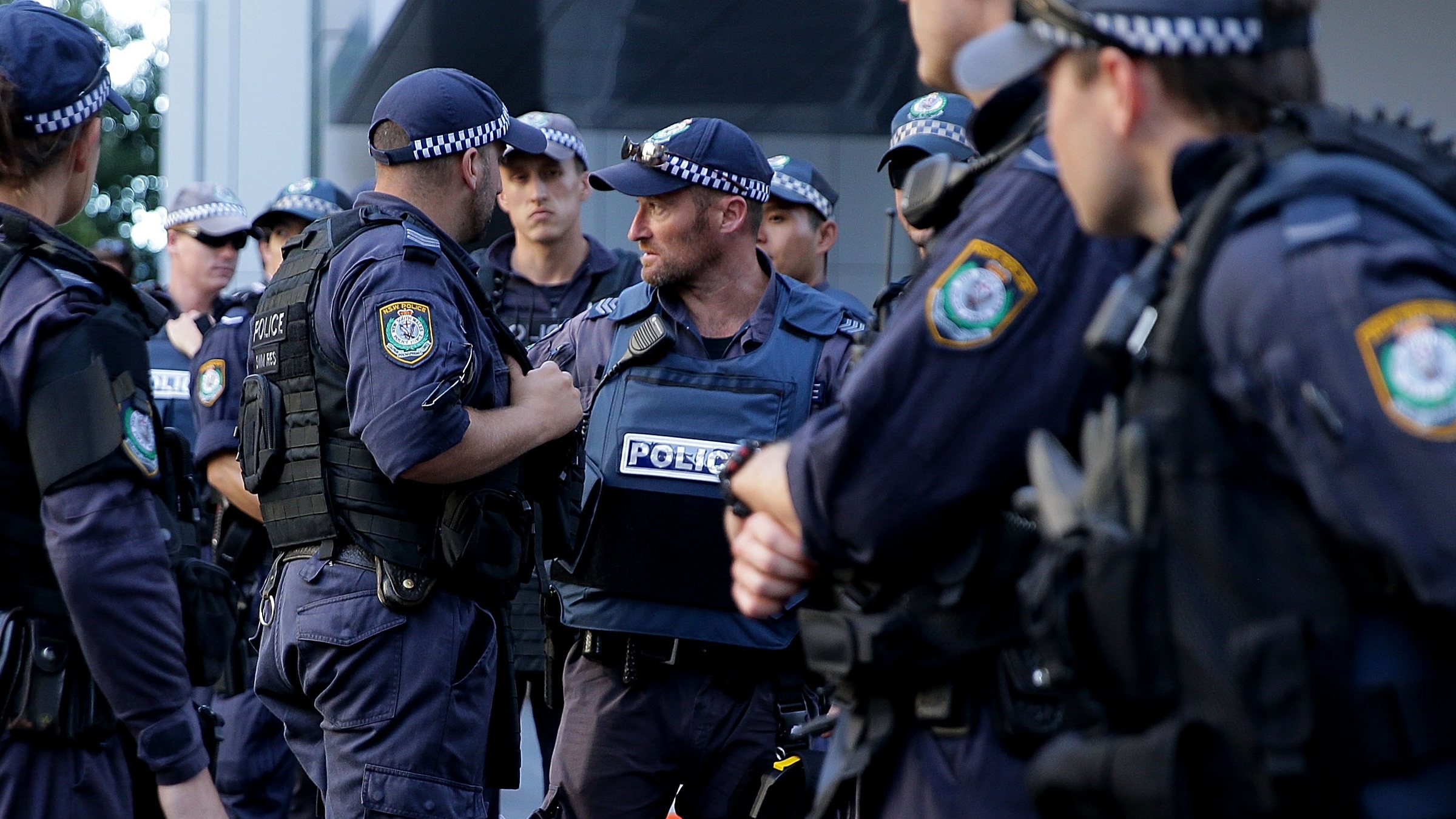Operation Trojan Shield: 800 criminals arrested in global FBI messaging app sting
Three-year operation culminates in police raids in 19 countries

A free daily email with the biggest news stories of the day – and the best features from TheWeek.com
You are now subscribed
Your newsletter sign-up was successful
More than 800 criminals around the globe have been arrested after being tricked into using an FBI-run encrypted messaging app in the “biggest and most sophisticated crime sting in history”.
The operation, described by the BBC as “a watershed moment”, was conceived by Australian police and the FBI and saw “devices with the ANOM app secretly distributed among criminals”, allowing police to catalogue more than 27 million messages relating to “drug smuggling, money laundering and even murder plots”.
Codenamed Operation Trojan Shield, the sting targeted drug gangs and people with links to the mafia, leading to the seizure of over eight tons of cocaine, 22 tons of marijuana, two tons of methamphetamines and amphetamines, 250 firearms and more than $48m (£33.8m) in various currencies, the US Department of Justice said.
The Week
Escape your echo chamber. Get the facts behind the news, plus analysis from multiple perspectives.

Sign up for The Week's Free Newsletters
From our morning news briefing to a weekly Good News Newsletter, get the best of The Week delivered directly to your inbox.
From our morning news briefing to a weekly Good News Newsletter, get the best of The Week delivered directly to your inbox.
Inside the sting
The seeds of Operation Trojan Shield were sown in 2017, when “the FBI in San Diego began investigating a secure messaging system” – named “Phantom Secure” – that was “being marketed exclusively to organised crime groups”, The Telegraph says.
Vincent Ramos, the CEO of Phantom Secure, was arrested in Las Vegas in 2019, leaving what police in New Zealand have described as “a significant void in the encrypted communication market”. “At this point”, The Telegraph says, “an anonymous informant… offered up his or her new tech to investigators”. And instead of “waiting for criminals to fill the niche, the FBI decided to enter the market themselves”.
The sting operation got under way in 2019, when the FBI began covertly operating the encrypted device network ANOM, before spreading devices with the chat app installed on them throughout the criminal underworld through a series of informants.
A free daily email with the biggest news stories of the day – and the best features from TheWeek.com
“ANOM devices were cellphones that had been stripped of all normal functions”, The New York Times (NYT) reports. They had just one working app “disguised as the calculator function”, allowing “users to send messages and photos with end-to-end encryption”.
Accessing the ANOM network required entering a code provided by another user and the phones could only be used to message other ANOM phones. They sold on the black market for around $2,000 (£1,400).
During the three-year operation, around 12,000 encrypted devices were distributed throughout more than 300 criminal syndicates in over 100 countries, Europol says, giving police an insight into “Italian organised crime, outlaw motorcycle gangs and international drug trafficking organisations”.
“Users trusted the devices’ security so much that they often laid out their plans not in code, but in plain language”, the NYT says. But “unbeknown to them” they were actually falling foul of an operation of “unprecedented scope” that saw the FBI and 16 other countries exploit the intelligence.
The “biggest and most sophisticated crime sting in history” saw various police forces manage to put the phones “into the hands of some of the most influential crime bosses on the planet”, The Telegraph says.
Australian fugitive and alleged drug trafficker Hakan Ayik was key to the operation, unwittingly recommending the app to his associates after being given a handset by undercover officers, Australian police said.
And after pulling off the “immense technological craft” needed to coordinate the sting, “the pay-off from the coordinated global raids announced on Tuesday was enormous”, The Telegraph adds.
Global raids
Police in at least 16 countries including Australia, Austria, Sweden, Denmark, Estonia, Lithuania, Norway, New Zealand, Britain, Germany and the United States were involved in a series of coordinated raids yesterday.
The UK’s National Crime Agency (NCA) said it carried out “multiple operations” as part of Operation Trojan Shield. A spokesperson said the agency “conducted multiple operations targeting organised crime groups involved in drug trafficking and money laundering”.
“This operation has demonstrated that, in the face of the rapidly evolving threat from criminals exploiting the fast expansion of technology, the NCA is committed to working across international borders to target organised criminals, wherever they are and however they communicate”, it added.
“Australian police said they had disrupted 21 murder plots and seized 3.7 tonnes of drugs during the operation”, the Financial Times reports, adding that “9,000 officers had taken part” in raids this week culminating in “224 arrests in Australia and 35 in New Zealand”.
Australian Prime Minister Scott Morrison said: “The Australian government, as part of a global operation, has struck a heavy blow against organised crime – not just in this country, but one that will echo around organised crime around the world.”
Swedish police said they had “thwarted at least 10 murders and arrested 155 suspects”, including several “leading figures in the criminal network, who have had a major influence in the drugs market, and at the same time have ordered violent acts in the form of, for instance, shootings”, The Telegraph reports.
Meanwhile in Germany, “70 people were arrested on suspicion of trafficking in drugs and weapons and 150 properties were raided across the country”, the paper adds. Local officials said Finnish police made almost 100 arrests, while 49 people were detained in the Netherlands.
The FBI did not break down the number of arrests for each country, however, the bureau unsealed an indictment against 17 people for distributing the ANOM devices. “Eight have so far been arrested, while the rest are on the run”, the BBC says.
The ANOM app is still operational. But as of Tuesday it had switched its previous tagline – “enforce your right to privacy” – for a new message inviting users to “discuss how your account has been linked to an ongoing investigation” by entering their account details, the NYT adds.
Joe Evans is the world news editor at TheWeek.co.uk. He joined the team in 2019 and held roles including deputy news editor and acting news editor before moving into his current position in early 2021. He is a regular panellist on The Week Unwrapped podcast, discussing politics and foreign affairs.
Before joining The Week, he worked as a freelance journalist covering the UK and Ireland for German newspapers and magazines. A series of features on Brexit and the Irish border got him nominated for the Hostwriter Prize in 2019. Prior to settling down in London, he lived and worked in Cambodia, where he ran communications for a non-governmental organisation and worked as a journalist covering Southeast Asia. He has a master’s degree in journalism from City, University of London, and before that studied English Literature at the University of Manchester.
-
 Local elections 2026: where are they and who is expected to win?
Local elections 2026: where are they and who is expected to win?The Explainer Labour is braced for heavy losses and U-turn on postponing some council elections hasn’t helped the party’s prospects
-
 6 of the world’s most accessible destinations
6 of the world’s most accessible destinationsThe Week Recommends Experience all of Berlin, Singapore and Sydney
-
 How the FCC’s ‘equal time’ rule works
How the FCC’s ‘equal time’ rule worksIn the Spotlight The law is at the heart of the Colbert-CBS conflict
-
 Epstein files topple law CEO, roil UK government
Epstein files topple law CEO, roil UK governmentSpeed Read Peter Mandelson, Britain’s former ambassador to the US, is caught up in the scandal
-
 Mexico’s vape ban has led to a cartel-controlled black market
Mexico’s vape ban has led to a cartel-controlled black marketUnder the Radar Cartels have expanded their power over the sale of illicit tobacco
-
 Iran and US prepare to meet after skirmishes
Iran and US prepare to meet after skirmishesSpeed Read The incident comes amid heightened tensions in the Middle East
-
 Israel retrieves final hostage’s body from Gaza
Israel retrieves final hostage’s body from GazaSpeed Read The 24-year-old police officer was killed during the initial Hamas attack
-
 China’s Xi targets top general in growing purge
China’s Xi targets top general in growing purgeSpeed Read Zhang Youxia is being investigated over ‘grave violations’ of the law
-
 Panama and Canada are negotiating over a crucial copper mine
Panama and Canada are negotiating over a crucial copper mineIn the Spotlight Panama is set to make a final decision on the mine this summer
-
 Why Greenland’s natural resources are nearly impossible to mine
Why Greenland’s natural resources are nearly impossible to mineThe Explainer The country’s natural landscape makes the task extremely difficult
-
 Iran cuts internet as protests escalate
Iran cuts internet as protests escalateSpeed Reada Government buildings across the country have been set on fire